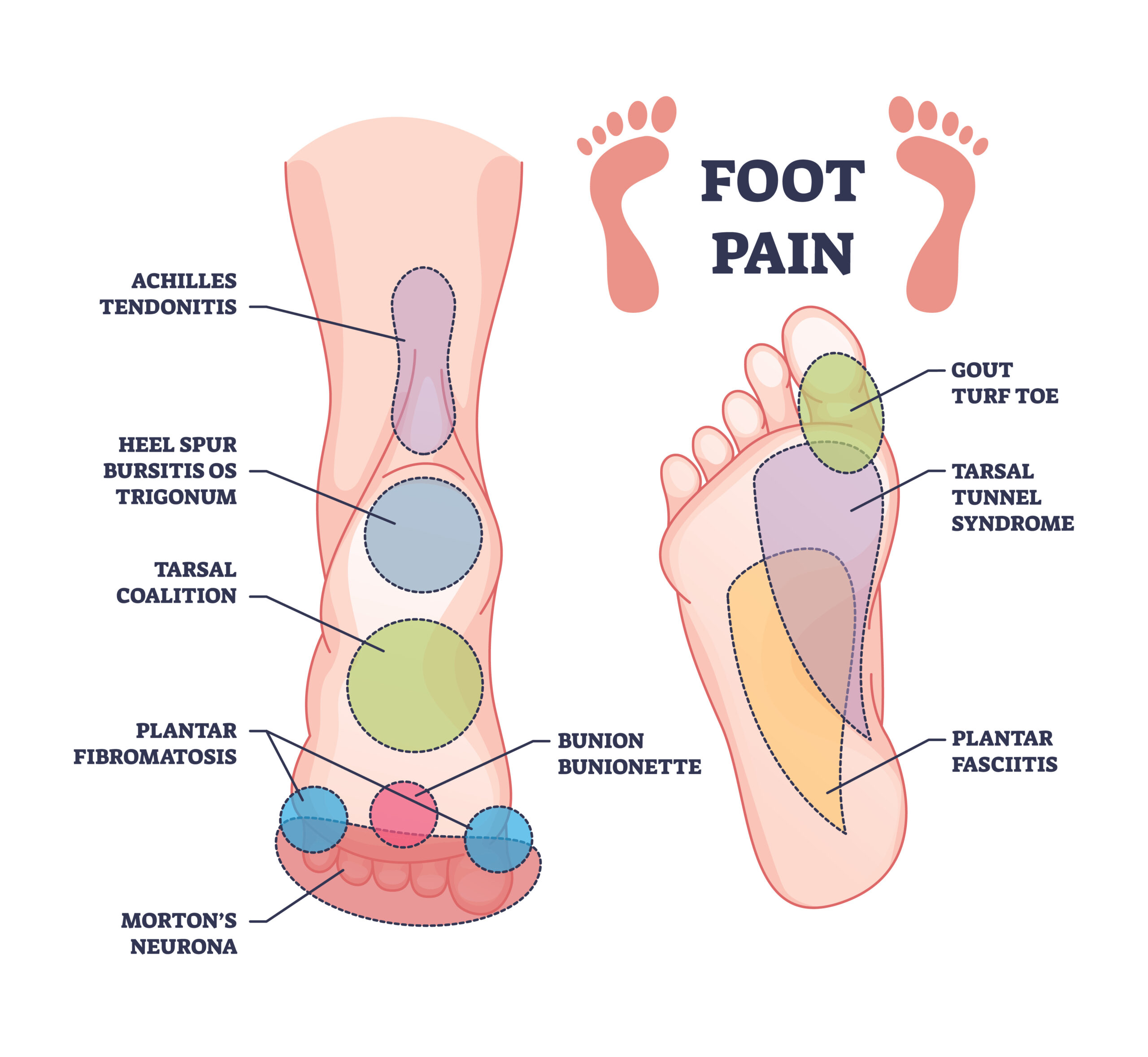Introduction
Nerve pain in the feet can be a debilitating condition that affects mobility, daily activities, and overall quality of life. Whether it’s a tingling sensation, burning pain, or sharp stabbing discomfort, nerve pain can interfere with even the simplest tasks like walking or standing for long periods.
Managing nerve pain effectively requires a combination of medical treatment, lifestyle changes, and home remedies. Understanding the underlying causes and seeking timely intervention can help prevent further complications. In this guide, we will explore the causes, symptoms, and various treatment options available to alleviate nerve pain in the feet.
Understanding Nerve Pain in the Feet

What is Nerve Pain?
Nerve pain, also known as neuropathic pain, occurs when there is damage, dysfunction, or irritation of the nerves. Unlike other types of pain, which result from direct injury to tissues, nerve pain stems from problems within the nervous system itself.
Common Causes of Nerve Pain in the Feet
Nerve pain in the feet can be caused by various conditions, including diabetes, injuries, autoimmune diseases, and nerve compression. Identifying the root cause is essential for proper management and treatment.
Symptoms to Watch For
- Tingling or burning sensations
- Sharp, shooting pain
- Numbness or loss of sensation
- Weakness in the feet or toes
- Sensitivity to touch or temperature changes
Recognizing these symptoms early can help prevent worsening of the condition and improve treatment outcomes.
Common Causes of Nerve Pain in the Feet
Peripheral Neuropathy
Peripheral neuropathy is one of the most common causes of nerve pain in the feet. It occurs when peripheral nerves (nerves outside the brain and spinal cord) are damaged, leading to pain, tingling, and numbness. This condition is often associated with diabetes, infections, and exposure to toxins.
Diabetes and Its Effect on Nerve Pain
Diabetes is a leading cause of nerve pain in the feet. High blood sugar levels can damage nerves over time, a condition known as diabetic neuropathy. This can result in numbness, burning pain, and an increased risk of foot ulcers.
Pinched Nerves and Neuromas
A pinched nerve, such as in tarsal tunnel syndrome, can lead to nerve pain in the feet. Morton’s neuroma, a thickening of nerve tissue in the foot, can also cause burning and stabbing pain between the toes.
Injuries and Trauma
Foot injuries, fractures, and sprains can cause nerve compression or damage, leading to chronic nerve pain. Even after the injury heals, nerve-related pain can persist.
Autoimmune Diseases and Their Impact on Nerves
Conditions like multiple sclerosis (MS), lupus, and rheumatoid arthritis can cause nerve inflammation and pain in the feet. These diseases trigger the immune system to attack nerve tissues, resulting in discomfort and mobility issues.
Diagnosing Nerve Pain in the Feet
Diagnosing nerve pain in the feet involves a combination of medical history assessment, physical examination, and diagnostic tests.
Physical Examinations
Doctors may check for muscle weakness, reflex abnormalities, and areas of numbness or pain.
Neurological Tests
These tests assess nerve function and detect abnormalities in nerve signals.
Imaging Tests (MRI, CT Scans)
MRI and CT scans can help identify structural problems such as herniated discs or nerve compression that may be causing pain.
Electromyography (EMG) and Nerve Conduction Studies
EMG and nerve conduction studies measure electrical activity in the nerves and muscles, helping to determine the extent of nerve damage.
Treatment Options for Nerve Pain in the Feet
Medications for Nerve Pain Relief
- Over-the-Counter Pain Relievers: Nonsteroidal anti-inflammatory drugs (NSAIDs) like ibuprofen can provide temporary relief.
- Prescription Medications: Antidepressants, anticonvulsants, and pain medications such as gabapentin or pregabalin may help manage nerve pain.
- Topical Treatments: Capsaicin creams and lidocaine patches can offer localized relief.
Physical Therapy and Exercises
Stretching and strengthening exercises can improve mobility and reduce nerve pain. A physical therapist can recommend specific exercises tailored to your condition.
Alternative Therapies
- Acupuncture: May help improve blood flow and nerve function.
- Massage Therapy: Can reduce muscle tension and improve circulation.
- Chiropractic Care: May help relieve nerve compression and pain.
Home Remedies for Managing Nerve Pain
Warm and Cold Therapy
Applying heat or ice packs can help soothe nerve pain and reduce inflammation.
Essential Oils and Natural Remedies
Lavender, peppermint, and eucalyptus oils can provide relief when massaged onto the affected area.
Foot Soaks and Epsom Salt Baths
Soaking feet in warm water with Epsom salt can ease pain and promote relaxation.
Lifestyle Changes to Reduce Nerve Pain
Making lifestyle changes can play a significant role in managing nerve pain in the feet. Small adjustments in daily habits can reduce discomfort and improve overall nerve health.
Proper Footwear Choices
Wearing the right shoes is crucial for preventing and managing nerve pain. Here are some tips:
- Choose well-cushioned shoes with good arch support.
- Avoid tight or high-heeled shoes that put pressure on the nerves.
- Opt for shoes made from breathable materials to prevent irritation.
- Use custom orthotics to improve foot alignment and reduce pain.
Healthy Diet for Nerve Health
What you eat can impact nerve health. A nutrient-rich diet helps reduce inflammation and supports nerve regeneration.
- Vitamin B12: Found in eggs, dairy, and fish, it helps prevent nerve damage.
- Omega-3 Fatty Acids: Present in salmon, walnuts, and flaxseeds, these reduce inflammation.
- Antioxidants: Berries, leafy greens, and nuts help protect nerves from damage.
- Magnesium & Potassium: Found in bananas, spinach, and nuts, they help with nerve function.
Stress Management Techniques
Chronic stress can worsen nerve pain. Relaxation techniques can help manage symptoms effectively:
- Meditation and deep breathing to calm the nervous system.
- Yoga and gentle stretching to improve circulation and flexibility.
- Journaling or engaging in hobbies to keep stress levels in check.
Preventing Nerve Pain in the Feet
Preventing nerve pain is easier than treating it. Here are key prevention strategies:
Controlling Blood Sugar Levels
For diabetics, maintaining stable blood sugar levels is essential. High sugar levels damage nerves over time.
- Monitor blood sugar regularly.
- Follow a balanced diet with low sugar and refined carbs.
- Stay active to improve insulin sensitivity.
Avoiding Prolonged Pressure on the Feet
Excessive standing, walking, or tight footwear can lead to nerve compression.
- Take breaks if you stand for long periods.
- Use padded insoles for extra support.
- Keep feet elevated when resting.
Regular Foot Care and Hygiene
Keeping your feet healthy can prevent complications related to nerve pain.
- Check for cuts, blisters, or infections daily.
- Keep feet clean and moisturized.
- Trim nails carefully to prevent ingrown toenails.
When to See a Doctor
Ignoring nerve pain can lead to complications, including permanent nerve damage. Seek medical help if:
- Pain worsens despite home remedies and medications.
- You experience numbness or weakness in the feet.
- There are open sores or infections that do not heal.
- You have balance issues or difficulty walking.
Early intervention can prevent severe complications and improve long-term outcomes.
Conclusion
Managing nerve pain in the feet requires a combination of treatments, lifestyle changes, and preventative measures. Understanding the causes, recognizing the symptoms, and taking proactive steps can make a significant difference. If pain persists, consulting a healthcare provider is crucial for proper diagnosis and treatment.
By taking care of your feet, making smart lifestyle choices, and seeking medical guidance when necessary, you can regain control over nerve pain and improve your overall quality of life.
FAQs
1. Can nerve pain in the feet be cured completely?
It depends on the cause. Some cases, such as temporary nerve compression, can be treated completely, while chronic conditions like diabetic neuropathy require ongoing management.
2. What are the best home remedies for nerve pain relief?
Applying heat or ice, using essential oils, soaking feet in Epsom salt, and wearing supportive footwear can help alleviate symptoms.
3. How does diabetes contribute to nerve pain?
High blood sugar damages nerve fibers over time, leading to diabetic neuropathy, which causes pain, tingling, and numbness in the feet.
4. Can exercise help reduce nerve pain?
Yes, gentle exercises improve blood circulation, strengthen muscles, and reduce pressure on nerves, helping with pain relief.
5. What are the warning signs of serious nerve damage?
Loss of sensation, extreme weakness, difficulty walking, and non-healing sores indicate severe nerve damage that requires immediate medical attention.








